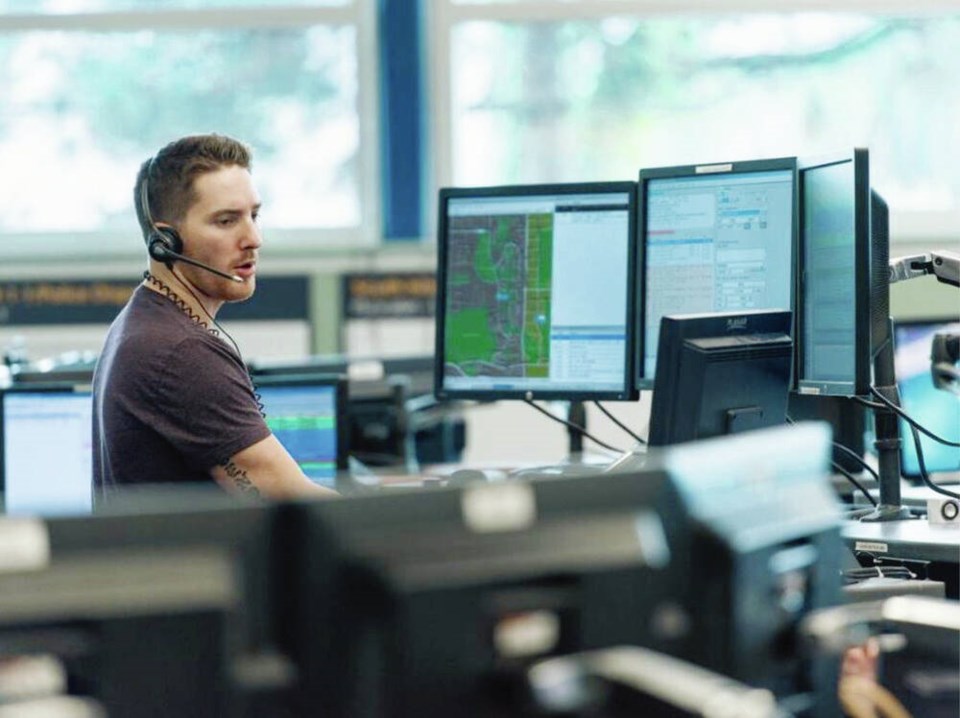British Columbians are being reminded to call 911 for true emergencies only as the centre responsible for answering the calls braces for its highest call volume in two decades.
E-Comm, the emergency communications centre responsible for answering B.C.’s 911 calls, is expecting an escalation in calls based on a loosening of COVID-19 restrictions on gatherings, increased cellphone use, an aging population, the illicit drug toxicity crisis, mental-health challenges and extreme weather events.
In the last quarter of 2021, call volumes were up 22 per cent compared to the year prior, according to E-Comm.
This year is shaping up to be even busier, with E-Comm predicting a further increase of 12 per cent in emergency calls.
Jasmine Bradley, spokeswoman for E-Comm, said the emergency centre is concerned about a pattern of increasing call volumes and the resulting strain on dispatchers and first responders.
“We’re seeing some of the highest emergency call volumes we’ve experienced in our 23 years of service,” she said on Monday.
In 2021, British Columbians dialed 911 more than 2 million times.
With the anticipated flocking of people to regional beaches and entertainment districts, police and fire also expect an increase in call volumes.
E-Comm says its service target is to answer 95 per cent of 911 calls in five seconds or less.
Last summer, the Times Colonist reported many instances in which callers waited hours or gave up and got themselves or their loved ones to hospitals. There were also reports of long waits this past weekend.
B.C. Emergency Health Services suggests calling 911 if there is a serious medical emergency, but calling HealthLinkBC at 811 to be connected to a nurse or doctor for less-urgent health issues.
British Columbians can also call 211 for information and referrals to social, community and government services in B.C., or refer to a municipality’s website for other concerns such as bylaw infractions and complaints.
Tips before dialling 911
• Ask yourself: Is someone’s health at risk? Is someone’s safety or property at risk right now? Is a crime in progress?
• Know your location, especially if you’re calling from a cellphone, so 911 call takers can direct first responders to find you quickly and easily.
• Lock and store your cellphone when not in use, don’t save 911 to your phone as a contact, and turn your device on airplane mode if being used by children for play to avoid pocket dials or mis-dialing.
• Don’t hang up. If you call 911 in error, stay on the line to let the call taker who answers know you dialed in error so they don’t need to follow up.
Other resources that can be called in emergencies
• B.C. Wildfire Service: To report wildfires that fall outside the jurisdiction of a local fire department, call 1-800-663-5555 or *5555 from a cellphone. Call 911 if you are unsure about who to call and the call taker will refer you to the B.C. Wildfire Service if required.
• Go to the DriveBC website or call 511 for information about road conditions and closures or other road infrastructure information.
• If a person is having a mental-health challenge but is no one’s safety is at risk, call the B.C. Crisis Centre at 310-6789 (no area code needed). If suicide is a concern but not an immediate risk, call 1-800-784-2433 (1-800-SUICIDE), or call your local crisis centre. If there is an immediate risk, call 911, says E-Comm.




